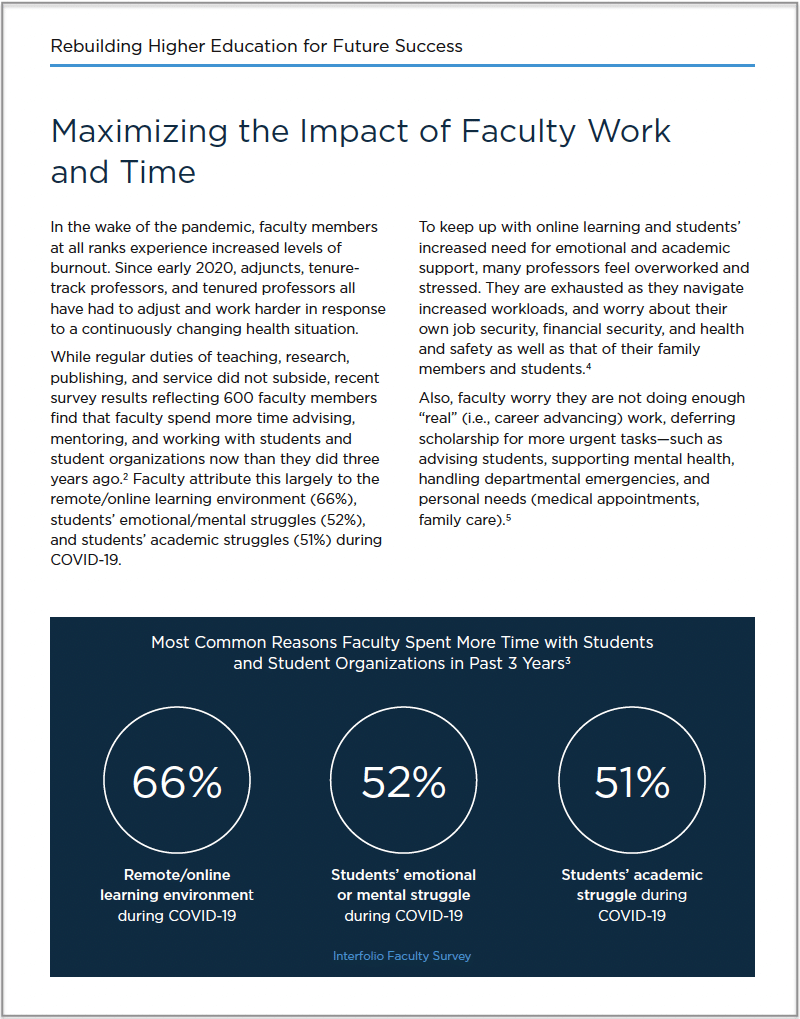Inside Higher Ed and Hanover Research recently published their 2022 Survey of College and University Chief Academic Officers. The survey, which polled 178 respondents representing 83 public, 87 private, and 8 for-profit institutions, uncovered how today’s academic leaders are thinking about faculty affairs.
Respondents answered a wide range of questions on topics including academic and financial institutional health and priorities; pandemic response; faculty engagement; tenure and retention as well as reliance on non-tenure track faculty; mental health; sexual harassment; and new policies and practices in the wake of widespread protests against police brutality.
Survey results reveal the following key insights on the current state of faculty affairs:
Academic Health
Most of the provosts rank their institution’s academic quality as good or excellent: 32% of provosts said excellent, 54% good, 12% fair and 2% poor.
The majority say that changes made during the pandemic have not negatively impacted academic quality. However, while they are confident about their institutions’ academics—98% say their institution provides a quality undergraduate education—respondents do not believe they are adequately supporting faculty and students’ families.
Only 22% percent of provosts agree their institution effectively recruits and retains talented faculty, and just 31% agree that their institution effectively controls rising prices for students and families.
Financial Health and Budget Priorities
Provosts are divided on whether their institutions’ financial situation has improved in the last year, and approximately 41% say that their institution made changes in their academic budgets due to the economic downturn in 2020.
In terms of budget priorities, nearly all (87%) academic leaders indicate that financial concerns are prevalent in their institution’s discussion about launching new academic programs.
For example, 87% plan to prioritize collaboration with other colleges and universities; 85% plan to expand online programs and offerings; 81% plan to fund programs based on their alignment with the institution’s mission; while just 4% would like to prioritize cutting athletic programs.
Faculty Engagement, Support, Burnout, and Mental Health
More than half (59%) of academic officers report that faculty currently feel very engaged with their work, but most (83%) indicate concerns that their institutions do not provide adequate resources to faculty to help them feel supported, engaged, and connected.
Seventy percent of IHE survey respondents find that their institution polls their faculty, staff, and administrators to assess job satisfaction. However, about half of provosts (51%) report that they neither agree nor disagree that their institution has taken concrete steps to address faculty burnout.
These findings echo faculty sentiments in Interfolio’s recent survey of faculty conducted in conjunction with Hanover Research, which found increased levels of faculty burnout and lack of institutional support/acknowledgement for faculty’s many critical tasks. We also found a strong correlation between faculty work engagement and job satisfaction.
Also, in the wake of the pandemic that put much pressure on faculty and students alike, provosts indicated that they are more likely to be aware of faculty, staff, and undergraduate mental health than graduate student mental health.
Tenure, Promotion, and Retention
When it comes to tenure, promotion, and retention, approximately 60% of provosts agree that tenure remains important and viable at their institution.
When considering a system of long-term contracts over the existing tenure system in higher education, about 60 percent of provosts indicate they would favor, and 40 percent would oppose. About three-fourths of respondents say their institution relies heavily on non-tenure track faculty and 72% believe this will continue in the future.
General Education and Liberal Arts
A significant 90% of survey respondents believe that general education is “a crucial part” of any college degree. Yet, only 29% of academic leaders agreed that their institution had “recently evaluated the effectiveness of our general education requirements” and 31% agreed that students understand the purpose of general education requirements.
Similarly, 89% of provosts strongly support the idea of liberal arts education and 86% deem it foundational to a healthy undergraduate education. However, most (69%) also agree that politicians and board members are prioritizing STEM and professional programs, and 71% agree that the number of liberal arts colleges will decline significantly over the next five years.
Academic leaders who place high importance on general education and liberal arts must do a better job of underscoring why broad competencies and crucial skills are valuable for students in a diverse and evolving world.
Optimism, with Work to Do
In the annual survey, chief academic officers express general satisfaction with the state of the education their institutions are offering and a predominately optimistic view of changes made during the pressures caused by the pandemic. More than half of provosts surveyed believe their institutions are “very effective” at providing a quality undergraduate education and preparing students for the world of work.
While the CAO Survey provides an overwhelmingly positive view of academic quality and financial institutional health in the aftermath of the COVID-19 pandemic, it also illuminates persistent challenges.
Chief academic officers note areas where significant improvement is needed, particularly in faculty recruitment, retention, and support. In fact, survey respondents say that the Great Resignation has affected their institution’s staff jobs (71%) the most, followed by faculty jobs (40%), and then administration jobs (32%).
At a time when the “Great Resignation” prevails in the larger workforce, and diversity, equity, and inclusion are also top priorities for colleges and universities, effective hiring and promotion activities and initiatives remain critical to institutional and student success.
White Paper: Rebuilding Higher Education
If you’re interested to learn more about how institutions are navigating these challenges, we recommend our white paper, The Time is Now: Rebuilding Higher Education: How Faculty Affairs Professionals Can Lead their Institutions to Future Success.

